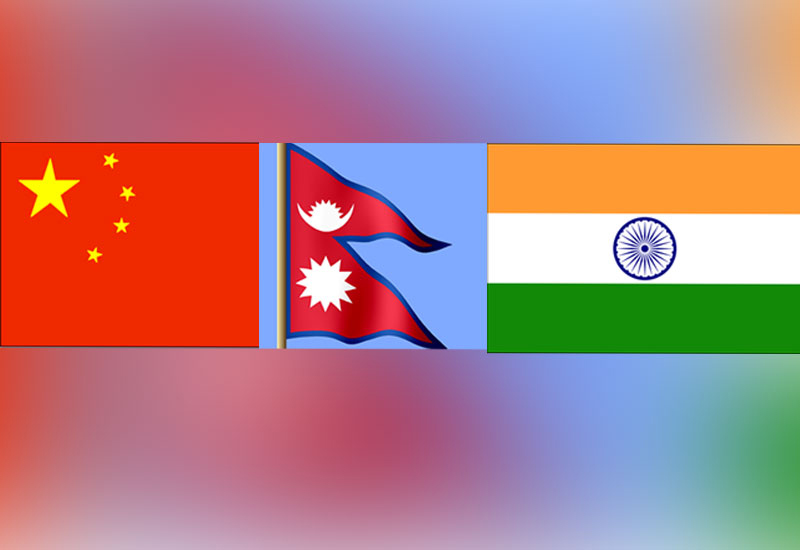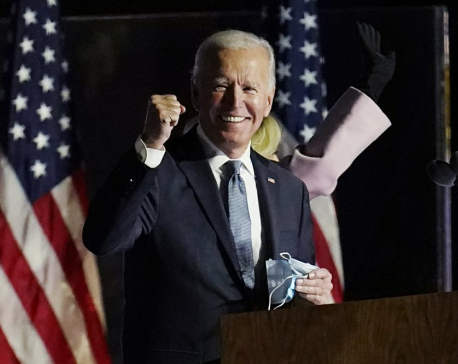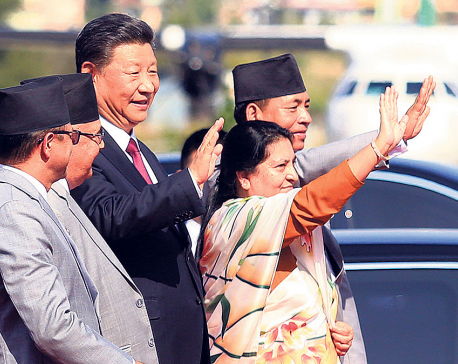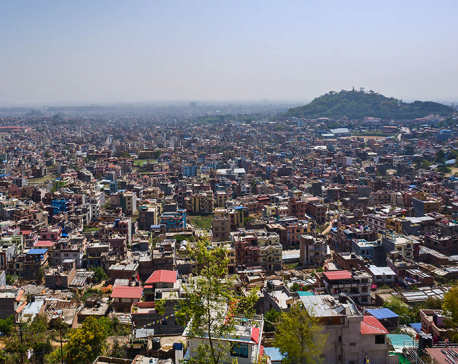
OR
Opinion
Balancing Act: Nepal's Delicate Dance with China and India
Published On: May 20, 2023 08:30 AM NPT By: Nabraj Lama


Nabraj Lama
The author is a research scholar with a primary focus on Himalayan Studies, international relations, political economy, and Indigenism. He is affiliated with the Himalayan Strategic Institute.news@myrepublica.com
More from Author
- Strengthening Indigenous Rights: Key to Peace and Prosperity in Nepal's Federal Era
- Unavoidable Realism of Nepal’s Geopolitical Strategy
- Nepal's 1923 Treaty with British India: A Centennial Reflection on Diplomatic Resilience and Sovereignty
- India's Role in South Asia: Pathways to Regional Prosperity and Peace
- The Unequal Balance of Power: Kathmandu's Dual Standard on Rule Enforcement
Nepal is strategically located between the emerging Asian giants: China and India. It has maintained cordial people-to-people relations with both countries. Nepal's geostrategic position not only attracts the attention of Asian rivals India and China but also the interest of global powers. India has always played a crucial role in Nepal's political transformations, such as abolishing the Rana rule in 1951, restoring democracy and ending the Panchayat system in 1990, and playing an influential role in ending a decade-long Maoist insurgency in 2006. India also facilitated a twelve-point understanding between the Maoist party and the Seven Parties Alliance. Thus, Nepalese people are indebted to India for its direct and indirect support for progressive changes in Nepal.
Similarly, Indian Prime Minister Narendra Modi visited Nepal on August 3, 2014, after a long gap of 17 years since the last visit by then Indian Prime Minister IK Gujral in June 1997. K.P Oli, Prime Minister of Nepal, was warmly welcomed on his first international state visit to India on April 6, 2018. There was a reciprocal visit of Indian PM Narendra Modi to Nepal, signaling an improvement in relations with Nepal. India has pledged the most significant aid amount worth US $1 billion for post-earthquake reconstruction. India is the fourth-largest bilateral donor based on disbursement in the fiscal year 2016/17. Despite this level of cooperation, the relationship between the two countries still seems unstable. India blames Nepal for playing the "China Card," and Nepal always perceives India's treatment as a big brother. India's micro-management policy on Nepal's domestic affairs remains an issue of concern and criticism. The economic blockade of 2015 weakened Narendra Modi's neighborhood policy and pushed Nepal closer to China.
China, India's primary counterpart in South Asia, is rapidly penetrating the Himalayas in Nepal. The Nepali government granted authority for Chinese NGOs to operate in Nepal by signing an agreement on July 29, 2018, for three years. China is expanding people-to-people relations between Nepalese, and many youths go to China for higher education every year under the Chinese government scholarship. The rate of Chinese tourists coming to Nepal is 14.5% in 2019. The Nepali government has provided free visas to Chinese citizens and hopes to increase the flow of Chinese tourists. Nepal signed the Memorandum of Understanding (MOU) on Cooperation under the Belt and Road Initiative on May 12, 2017, with China. These cooperation with China may seem like Nepal is tightly bound to China, but Nepalese should understand that both neighbors are equally essential.
It is a challenge for a small and underdeveloped country like Nepal to maintain equidistance and balanced relations with Asian rivals India and China. However, Nepal does not have any other options and must do so for a peaceful and prosperous future. It should not forget historical political and economic collaboration with India and should not neglect potential infrastructure development and economic opportunities from China. Most importantly, both India and China should not put Nepal in a position where it needs to choose between them.
To maintain a balanced relationship with both neighbors, Nepal should invest in infrastructure development that will benefit from its relations with both countries. Developing transport links, such as railways and highways connecting Nepal to India and China, will facilitate trade and economic cooperation. This will not only improve Nepal's economic prospects but also strengthen regional connectivity and cooperation.
Another area of focus should be the energy sector. Nepal has immense hydropower potential, which, if developed, can turn the country into a significant energy exporter to both India and China. Nepal can leverage its hydropower resources to attract investment from both countries, creating a win-win situation for all parties involved. A collaborative approach to developing hydropower projects can help Nepal address its energy needs, provide revenue through electricity exports, and enhance regional cooperation.
Furthermore, Nepal should also promote tourism to strengthen people-to-people relations with both India and China. The country's unique cultural heritage and natural beauty can be a significant draw for tourists from both nations. The Nepali government can focus on developing tourism infrastructure and promoting its destinations in India and China to attract more visitors. By increasing cultural exchanges and interactions between the peoples of these countries, Nepal can foster better understanding and goodwill, ultimately contributing to stronger bilateral relations.
In addition to these initiatives, Nepal should actively participate in regional forums and platforms involving both India and China, such as the Shanghai Cooperation Organization (SCO), and the Asian Infrastructure Investment Bank (AIIB). Engaging in multilateral dialogues and collaborations can help Nepal maintain a balanced relationship with its neighbors and contribute to regional stability and development.
Moreover, Nepal should pursue an independent foreign policy that prioritizes its national interests while maintaining friendly relations with both India and China. This requires a strong and stable government that can effectively manage its foreign relations and navigate the complex geopolitics of the region. By ensuring political stability and adopting pragmatic diplomacy, Nepal can create an environment conducive to economic development and regional cooperation.
Education and skill development are other areas where Nepal can benefit from cooperation with both India and China. The Nepali government should encourage and facilitate academic exchanges and collaborations between universities and research institutions of the three countries. This will help Nepali students and researchers gain access to knowledge and expertise from both India and China, ultimately contributing to the country's human resource development.
In conclusion, Nepal's strategic location between India and China presents both challenges and opportunities. It is crucial for Nepal to maintain a balanced relationship with both neighbors, ensuring that it does not compromise its national interests. By focusing on infrastructure development, energy cooperation, tourism, education, and regional engagement, Nepal can effectively leverage its position to promote peace, prosperity, and stability in the region. The Nepali people must understand that while close ties with China are essential for their development, they should not forget the historical political and economic collaboration with India. Both neighbors are equally important, and it is in Nepal's best interest to foster strong and mutually beneficial relations with both countries.
You May Like This

What Biden's victory means for South Asia and Nepal
The US policy towards Nepal generally remains unchanged by the change of guard in the White House. Yet, Nepal will... Read More...

Understanding Chinese ambition
Strategic culture, Professor Colin S Gray says, “rests primarily upon the interpretation of history and history’s geography.” In September 1949,... Read More...

India to surpass China as world's most populous country in next eight years: UN report
NEW YORK, June 18: India is projected to surpass China as the world's most populous country in the next eight... Read More...









Just In
- Heavy rainfall likely in Bagmati and Sudurpaschim provinces
- Bangladesh protest leaders taken from hospital by police
- Challenges Confronting the New Coalition
- NRB introduces cautiously flexible measures to address ongoing slowdown in various economic sectors
- Forced Covid-19 cremations: is it too late for redemption?
- NRB to provide collateral-free loans to foreign employment seekers
- NEB to publish Grade 12 results next week
- Body handover begins; Relatives remain dissatisfied with insurance, compensation amount








Leave A Comment